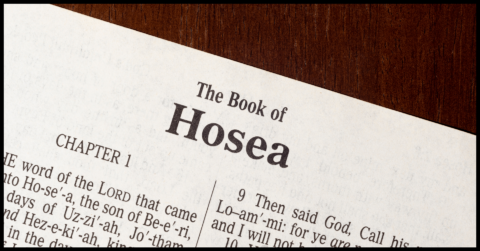
The beginning of the book of Hosea sets the timeline. He received words from God, “in the days of Uzziah, Jotham, Ahaz, and Hezekiah, kings of Judah, and in the days of Jeroboam the son of Joash, king of Israel” (Hosea 1:1). This reign of the second Jeroboam is related in 2 Kings 14:23-29. Jeroboam reigned over a nation that was fully steeped in idolatry, which was soon to fall to the mighty nation of Assyria. The people were taken into captivity, and the northern nation was no more. The internal evidence seems to indicate that Hosea’s ministry of prophecy took place only a few decades before the end of the nation in 722 B.C.
It is important to note how God felt toward idolatry. The beginning of the 10 commandments given by God is, “You shall have no other gods before Me. You shall not make for yourself a carved—any likeness of anything that is in heaven above, or that is in the earth beneath, or that is in the water under the earth; you shall not bow down to them nor serve them. For I, the Lord your God, am a jealous God…” (Exodus 20:3-5a). Idolatry was considered a great unfaithfulness, a spiritual adultery to God. And yet, for its entire existence, the northern kingdom of Israel consistently practiced the sin.
Hosea’s married life mimicked the idolatry of Israel. The instructions of God to the prophet was for him to experience first hand the effects of unfaithfulness. God told him to take himself a “wife of harlotry” (Gomer), and “children of harlotry” (Jezreel, Lo-Ruhama, Lo-Ammi). Hosea’s experience greatly afflicted and affected this man of God.
Interestingly, God named the three children. His firstborn son was named Jezreel, which portended the end to the kingdom of the house of Israel. As God said, “It shall come to pass in that day that I will break the bow of Israel in the valley of Jezreel” (1:5). Hosea’s daughter by Gomer was named Lo-Ruhama. The significance of this name was God’s declaration, “I will have no longer have mercy on the house of Israel, but I will utterly take them away” (1:6). His final son, conceived after the weaning of his daughter, was named by God Lo-Ammi, signifying two things: 1) “For you are not My people, and I will not be your God” (1:9). And, 2) A restoration in the Messianic kingdom, “Then the children of Judah and the children of Israel shall be gathered together, and appoint for themselves one head; and they shall come up out of the land, for great will be the day of Jezreel!” (1:11).
Israel was described as an unfaithful spouse in her adulteries. Using the imagery of a jilted husband, God said, “For she did not know that I gave her grain, new wine, and oil, and multiplied her silver and gold — which they prepared for Baal. “Therefore I will return and take away My grain in its time and My new wine in its season, And will take back My wool and My linen, given to cover her nakedness. Now I will uncover her lewdness in the sight of her lovers,
And no one shall deliver her from My hand” (Hosea 2:8-10 ).
The sins of the people this late in the short history of the northern nation were manifold. In addition to idolatry, a description given in Hosea 4 includes: no truth or mercy, no knowledge of God, swearing, lying, killing, stealing, committing adultery (4:1-2). Perhaps you are familiar with this expression of judgment: “My people are destroyed for lack of knowledge. Because you have rejected knowledge, I will also reject you from being priest for Me; because you have forgotten the law of your God, I also will forget your children” (4:6-8).
Chapter 4:11-19 describes the idolatry of Israel as harlotry, and the message of the prophet is their coming judgment of God. That judgment is related clearly in chapter 5, verses 6 and 15. “With their flocks and herds they shall go to seek the Lord, but they will not find Him; He has withdrawn Himself from them.” … “I will return again to My place till they acknowledge their offense. They will seek My face; in their affliction they will earnestly seek Me.”
Chapter 6 begins in the first three verses with the voice of Hosea, calling for the repentance of the nation. Then, the words of judgment from God because of apostasy continue from 6:4—10:15.
In chapter 11, verse 5 God reveals clearly that the nation will fall to the Assyrians. “He shall not return to the land of Egypt; but the Assyrian shall be his king, because they refused to repent.” While there is a final chapter (14) that indicates a restoration of Israel because of God’s mercy, Hosea lived in a time where the hope of averting judgment was past. He was desolate in knowing that as his harlot wife was unfaithful to him, so too Israel persisted in harlotry against the Lord. Judgment was sure. Hosea’s declarations were an explanation of why God’s judgment has been declared and settled. His final words declared not only the righteousness of God’s judgment, but the ultimate end of all who turn away from Him. “Who is wise? Let him understand these things. Who is prudent? Let him know them. For the ways of the Lord are right; the righteous walk in them, but transgressors stumble in them.” (14:9).
We live in similar times. Times of ignorance, violence and idolatry. We need to acknowledge that those who are righteous walk in the ways of the Lord, but those same ways cause the transgressors of our times to stumble (cf. 2 Thessalonians 1:4-10). Praise be to God for His righteousness!




